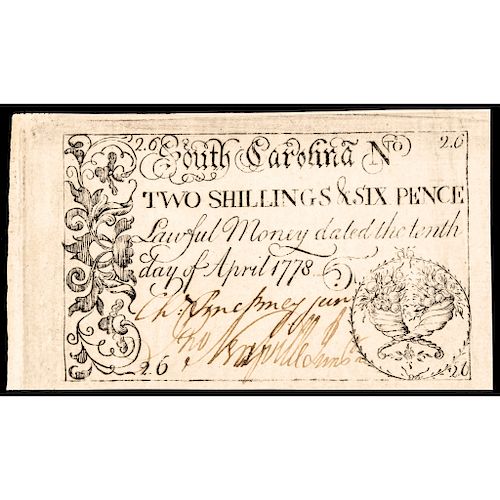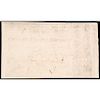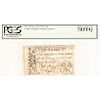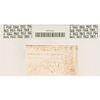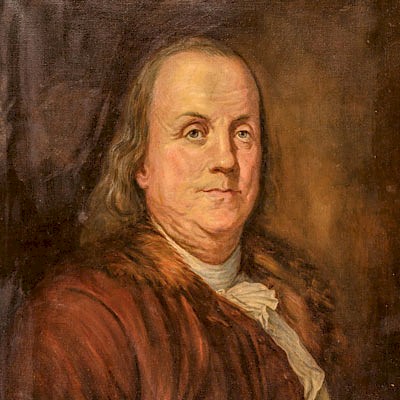CHARLES PINCKNEY, JR Signed Colonial Currency SC. April 1778 2s6d PCGS AU-58 PPQ
Lot 72
Estimate:
$600 - $800
Absentee vs Live bid
Two ways to bid:
- Leave a max absentee bid and the platform will bid on your behalf up to your maximum bid during the live auction.
- Bid live during the auction and your bids will be submitted real-time to the auctioneer.
Bid Increments
| Price | Bid Increment |
|---|---|
| $0 | $10 |
| $200 | $20 |
| $300 | $25 |
| $500 | $50 |
| $1,000 | $100 |
| $2,000 | $200 |
| $3,000 | $250 |
| $5,000 | $500 |
| $10,000 | $1,000 |
| $20,000 | $2,000 |
| $30,000 | $2,500 |
| $50,000 | $5,000 |
| $100,000 | $10,000 |
| $200,000 | $20,000 |
| $300,000 | $25,000 |
| $500,000 | $50,000 |
About Auction
By Early American History Auctions
Aug 24, 2019
Set Reminder
2019-08-24 12:00:00
2019-08-24 12:00:00
America/New_York
Bidsquare
Bidsquare : Autographs, Colonial Currency, Political Americana, Historic Guns
https://www.bidsquare.com/auctions/early-american-history-auctions/autographs-colonial-currency-political-americana-historic-guns-4347
Historic Autographs • Colonial Currency • American Civil War Colonial Era • Revolutionary War • Political Americana • Black History Early American History Auctions auctions@earlyamerican.com
Historic Autographs • Colonial Currency • American Civil War Colonial Era • Revolutionary War • Political Americana • Black History Early American History Auctions auctions@earlyamerican.com
- Lot Description
Autographs
Charles Pinckney Jr. Signed April 10, 1778 South Carolina Note PCGS Choice About New-58 Premium Paper Quality
CHARLES PINCKNEY, JR. (1757-1824). Signer of the U.S. Constitution, Member of the Continental Congress, Governor of South Carolina, U.S. Senator, United States Minister to Spain.
South Carolina. April 10, 1778. Two Shillings Six Pence. "Cornucopias" vignette. Signed by Charles Pinckney, Jr., PCGS graded Choice About New-58 Premium Paper Quality. Fr. SC-145. Pinckney's autograph signature is highly collected and valuable in its own right. This note is extremely crisp and clean, well printed, and nicely signed in rich brown ink. Its four choice full margins providing excellent centering, inclusive of a jumbo sheet margin at left. A lovely "PPQ" noted premium quality Charles Pinckney Jr. signed Revolutionary War period note. The paper is wonderfully original with a perfectly printed design. At bottom are two nicely penned signatures.
Charles Pinckney, Jr. (1757-1824) was elected to the Continental Congress from 1777-1778. He then started to practice law in Charleston in 1779 at the age of 21. About that time, well after the War for Independence had begun, young Pinckney enlisted in the militia. He became a lieutenant, and served at the siege of Savannah, GA. from September through October 1779. When Charleston fell to the British the next year, the young Pinckney was captured and held as a prisoner until June 1781.
He was elected again to the Continental Congress following the war, serving 1784-87. He was elected to the state legislature for several terms (1779-80, 1786-89, and 1792-96). As a Nationalist, he worked hard in Congress trying to ensure that the United States would receive navigation rights from Spain to the Mississippi River and to strengthen congressional power.
Pinckney's role in the Constitutional Convention is controversial. Although one of the youngest delegates, he later claimed to have been the most influential one and contended he had submitted a draft, known as the "Pinckney Plan", that was the basis of the final Constitution. He submitted an elaborate form of the "Virginia Plan", submitted by Edmund Randolph, but it was disregarded by the other delegates. Historians assess him as an important contributing delegate.
Pinckney boasted that he was 24, allowing him to claim distinction as the youngest delegate, but he was 30 years old that year. He attended full-time, spoke often and effectively, and contributed immensely to the final draft and to the resolution of problems that arose during the debates. He also worked for ratification in South Carolina (1788).
At the Convention, Pierce Butler and Pinckney, both from South Carolina, introduced the Fugitive Slave Clause (Article IV, Section II, Clause III). Declaration of Independence signer James Wilson of Pennsylvania objected, saying that it was special protection for slave holders, requiring all state governments to enforce it at taxpayers' expense, in places where no one or most residents did not own slaves. Butler withdrew the clause. But, the next day, a southerner reinstated the clause and the Convention adopted it without further objection. This clause was added to the clause that provided extradition for fugitives from justice.
"No Person held to Service or Labour in one State, under the Laws thereof, escaping into another, shall, in Consequence of any Law or Regulation therein, be discharged from such Service or Labour, but shall be delivered up on Claim of the Party to whom such Service or Labour may be due."
This clause was first applied to fugitive slaves and required that they be extradited upon the claims of their masters. This practice was not eliminated until the Thirteenth Amendment abolished slavery. In 1864, during the Civil War, an effort to repeal this clause of the Constitution failed.
He was also responsible for another important clause to the Constitution that later was used, along with the 1st and 14th amendments, to vacate several state constitutions' clauses requiring oaths of office holders to affirm a deity.
Charles' home state of South Carolina had established Protestantism as the state religion so it was interesting that he introduced a clause into the Constitution article VI in opposition to an established state religion. His "no religious test" clause read as follows: "no religious test shall ever be required as a qualification to any office or public trust under the United States".
Once the inclusion of the phrase was brought to a vote it passed with little opposition and so for the first time in history an official of a national government was not required to have a religion. Interesting also was that the final blow to states requiring office holders to swear to God was fought in his home state of South Carolina, that had originally had an established state religion, in the 1997 South Carolina Supreme Court case of Silverman v. Campbell.
Subsequent to his importance and influence as a delegate, Pinckney's political career blossomed. From 1789 to 1792, the state legislature elected him as Governor of South Carolina, and in 1790 he chaired the state constitutional convention. During this period, he became associated with the Federalist Party, in which he and his cousin Charles Cotesworth Pinckney were leaders. But, with the passage of time, the former's views began to change.
In 1795 he attacked the Federalist-backed Jay's Treaty. He increasingly began to cast his lot with Carolina back-country Democratic-Republicans against his own eastern aristocracy. The population in the western part of the state was increasing, but apportionment favored the Low Country planters. In 1796 Pinckney was elected Governor again by the state legislature. In 1798 his Democratic-Republican supporters in the legislature elected him to the U.S. Senate.
Pinckney strongly opposed actions by his former party, and in the presidential election of 1800, served as Thomas Jefferson's campaign manager in South Carolina. The victorious Jefferson appointed Pinckney as Minister to Spain (1801-05). He tried but did not succeed in gaining cession by Spain of the Floridas to the United States. He facilitated Spanish acquiescence in the transfer of Louisiana from France to the United States in 1803 by the Louisiana Purchase.
Pinckney returned from Spain to Charleston and to leadership of the State (Democratic) Republican Party. He sat in the legislature in 1805-06 and was again elected as Governor (1806-08). In this position, he favored legislative reapportionment, giving better representation to back-country districts, and advocated universal white manhood suffrage.
He served again in the legislature from 1810 to 1814, and then temporarily withdrew from politics. In 1818 he won election to the United States House of Representatives, where he fought against the Missouri Compromise as he was interested in having slavery be expanded to new territories and states.
In 1821, with his health beginning to fail, Pinckney retired for the last time from politics. He died in 1824, three days after his 67th birthday. He was laid to rest at St. Philip's Episcopal Churchyard in Charleston.
- Shipping Info
-
Early American provides in-house worldwide shipping. Please contact us directly if you have questions about your specific shipping requirements.
-
- Buyer's Premium



 EUR
EUR CAD
CAD AUD
AUD GBP
GBP MXN
MXN HKD
HKD CNY
CNY MYR
MYR SEK
SEK SGD
SGD CHF
CHF THB
THB